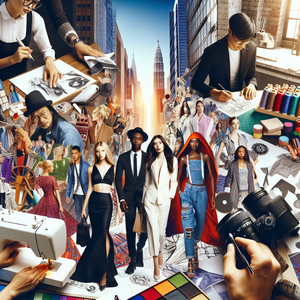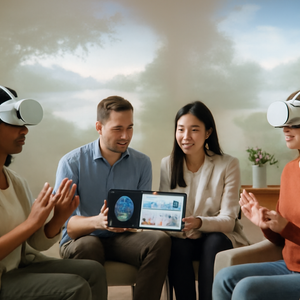
Discover 20 Thrilling Careers in Fashion: Roles, Skills, and Pathways to Success
The fashion industry is a vibrant tapestry of creativity and commerce, offering a multitude of career paths for those with diverse talents and interests. Whether your passion lies in design, marketing, or management, this dynamic field is constantly evolving, influenced by trends, technology, and consumer demands. In this article, we’ll explore 20 exciting careers in fashion, detailing their responsibilities, required skills, and how they contribute to the industry's ever-changing landscape. Additionally, we’ll provide insights on how aspiring professionals can break into these roles.
Job Summaries:
Fashion Designer:
- Fashion Designers are the creative minds behind clothing, accessories, and footwear.
- Their role involves researching trends, sketching designs, selecting fabrics, and supervising production.
- A comprehensive understanding of textiles and garment construction is crucial, along with proficiency in design software.
- Most designers hold degrees in fashion design or related fields and showcase their work in portfolios.
- This position is vital for shaping collections and influencing market trends.
Fashion Stylist:
- Fashion Stylists curate looks for clients, fashion shows, and editorial photoshoots, playing a key role in visual storytelling.
- They must stay abreast of trends, possess an eye for detail, and communicate effectively with clients and collaborators.
- A background in fashion merchandising or design can be advantageous.
- Stylists help brands articulate their identities through carefully chosen outfits, creating a lasting impact.
Fashion Merchandiser:
- Fashion Merchandisers analyze market trends and consumer behavior to strategically plan and promote products.
- Responsibilities include developing pricing strategies, managing inventory, and collaborating with designers and retailers.
- A degree in merchandising, marketing, or a related field is typically required, along with strong analytical skills.
- This role is crucial for a brand's commercial success and customer engagement.
Technical Designer:
- Technical Designers bridge the gap between design and production, ensuring garments meet specified standards.
- They create technical specifications, conduct fittings, and collaborate with manufacturers to address production issues.
- A background in fashion design or apparel engineering is often necessary, along with problem-solving abilities.
- This role is essential for maintaining quality and realizing the designer’s vision.
Fashion Buyer:
- Fashion Buyers select and purchase apparel and accessories for retail environments.
- They leverage market trends and sales data to inform their choices.
- A degree in business, marketing, or fashion merchandising is typically required.
- Strong negotiation skills are essential for this role.
- This role significantly influences a store's inventory alignment with customer demands.
- It impacts overall sales and profitability.
Quality Assurance Manager:
- Quality Assurance Managers oversee quality control processes in fashion production.
- They ensure that products adhere to industry standards before they reach consumers.
- They implement quality assurance policies and conduct inspections.
- A degree in quality management or a related field is beneficial.
- Experience in quality control is important.
- This role is fundamental to maintaining a brand's reputation for quality.
Fashion Illustrator:
- Fashion Illustrators create visual representations of clothing designs for presentations and marketing materials.
- Strong drawing skills and a solid understanding of fashion aesthetics are necessary.
- A background in fine arts or design is advantageous.
- They play a significant role in translating designers' concepts into engaging visuals.
Visual Merchandiser:
- Visual Merchandisers design captivating displays in retail spaces to enhance the shopping experience and drive sales.
- They utilize layout, color, and lighting strategies to showcase products effectively.
- A degree in visual merchandising, design, or marketing is often required, along with creativity and an understanding of consumer behavior.
Fashion Marketer:
- Fashion Marketers create and execute marketing campaigns to elevate fashion brands and products.
- Familiarity with digital marketing, social media, and consumer engagement strategies is essential.
- A degree in marketing or a related field, combined with creativity and analytical skills, is crucial for building brand awareness in a competitive landscape.
Personal Shopper:
- Personal Shoppers guide clients in selecting clothing and accessories that resonate with their individual styles and needs.
- Strong interpersonal skills and a keen sense of fashion trends are vital, along with retail or styling experience.
- This role enhances the customer experience and helps clients navigate the often overwhelming fashion landscape.
Fashion Journalist:
- Fashion Journalists report on trends, industry news, and brand stories through articles and social media platforms.
- Excellent writing skills and a thorough understanding of the fashion industry are essential.
- A degree in journalism or communications is typically required.
- This role shapes public perception and dialogue around fashion, making it a powerful position within the industry.
Garment Technologist:
- Garment Technologists focus on the technical aspects of garment production.
- They ensure that designs are feasible and fit correctly.
- They collaborate with designers and manufacturers.
- They conduct fittings and quality checks.
- A background in fashion technology or design is necessary to succeed in this role.
Fashion Public Relations Specialist:
- Fashion Public Relations Specialists manage the public image of fashion brands.
- They craft press releases and organize promotional events.
- A degree in public relations or communications is often required.
- Strong writing and communication skills are essential.
- This role enhances brand visibility and public perception.
- It is vital for brand success.
Textile Designer:
- Textile Designers create patterns for fabrics used in clothing and home textiles.
- An understanding of color theory, textile properties, and design software is critical.
- A degree in textile design is typically required.
- This role is essential for developing unique materials that enhance fashion collections.
Accessory Designer:
- Accessory Designers specialize in creating bags, shoes, and jewelry that complement fashion collections.
- Creativity, material knowledge, and design skills are essential for success.
- A background in fashion or accessory design can be beneficial, as this role contributes to the overall aesthetic appeal of fashion lines.
Fashion Photographer:
- Fashion Photographers capture striking images for advertisements and publications.
- They showcase clothing in visually compelling ways.
- A robust portfolio is necessary for this role.
- Technical skills are necessary for this role.
- An understanding of fashion aesthetics is necessary for this role.
- Experience in styling is advantageous.
- Experience in lighting is advantageous.
Fashion Technician:
- Fashion Technicians support the production process.
- They ensure that garments meet specifications.
- They conduct fittings and troubleshoot issues.
- A technical background in fashion or garment construction is required.
Retail Manager:
- Retail Managers oversee daily operations in fashion retail stores.
- Managing staff, inventory, and customer service.
- Strong leadership skills are essential for success in this role.
- A background in retail management is essential for success in this role.
- They drive sales and ensure a positive shopping experience for customers.
Fashion Event Planner:
- Fashion Event Planners organize events like fashion shows and product launches.
- Strong organizational skills and attention to detail are crucial.
- Experience in event planning is beneficial.
- This role creates memorable experiences that enhance brand visibility and engagement.
Fashion Analyst:
- Fashion Analysts conduct market research to identify trends and consumer preferences.
- They require strong analytical skills and a background in business or marketing.
- This role informs business strategies and ensures that brands remain relevant in an ever-evolving market.
In conclusion, the fashion industry presents an exciting array of career opportunities that cater to diverse interests and skill sets. As trends evolve and new roles emerge, the field remains a thrilling option for aspiring professionals. Whether you wish to design, market, or manage, there's a place for you in this ever-evolving sector. With the right education, experience, and passion, you can carve out a rewarding career in the world of fashion.
Explore More Jobs

